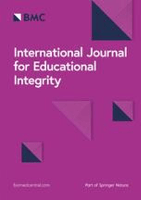
International Journal for Educational Integrity
Scope & Guideline
Pioneering Solutions for Educational Ethics
Introduction
Aims and Scopes
- Exploration of Academic Integrity Challenges:
The journal focuses on identifying and analyzing various challenges related to academic integrity, such as cheating, plagiarism, and contract cheating, particularly in the context of emerging technologies and online learning. - Research on Educational Policies and Practices:
It examines policies and practices that promote academic integrity across different educational levels, providing insights into effective strategies for preventing academic misconduct and fostering ethical behavior among students. - Impact of Technology on Academic Integrity:
The journal investigates the influence of technological advancements, including AI and digital tools, on academic integrity, exploring both the risks and potential solutions these technologies present. - Cultural and Contextual Perspectives:
It highlights the importance of cultural and contextual factors in shaping perceptions and behaviors related to academic integrity, offering a global perspective on integrity issues across various educational systems. - Empirical Studies and Interventions:
The journal publishes empirical research that evaluates interventions aimed at improving academic integrity, providing evidence-based insights into effective practices and frameworks.
Trending and Emerging
- Impact of Artificial Intelligence on Integrity:
There is a significant increase in research addressing the implications of AI and generative technologies on academic integrity, highlighting concerns about AI-generated writing and the effectiveness of detection tools. - Mindfulness and Ethical Behavior:
Emerging studies are exploring the psychological aspects of integrity, including the role of mindfulness in reducing academic dishonesty, indicating a trend towards understanding emotional and cognitive influences on ethical behavior. - Global Perspectives on Academic Integrity:
Recent publications emphasize the need for global perspectives, examining how academic integrity is perceived and practiced in diverse cultural contexts, thus broadening the scope of integrity research. - Innovative Educational Approaches:
There is a growing trend towards the development and evaluation of innovative educational tools and interventions aimed at promoting academic integrity, such as gamification and online teaching resources. - Interdisciplinary Approaches to Integrity:
Emerging themes reflect an interdisciplinary approach to studying academic integrity, integrating insights from psychology, sociology, and technology studies to provide a comprehensive understanding of integrity issues.
Declining or Waning
- Traditional Views on Cheating:
There appears to be a waning focus on traditional binary perspectives of cheating (i.e., cheating vs. not cheating), as more nuanced discussions around motivations, contexts, and ethical considerations are emerging. - General Plagiarism Studies:
While plagiarism remains a concern, the journal has shifted towards more specific studies, such as those involving AI-generated content, suggesting a reduced emphasis on general plagiarism research. - Single-Factor Analyses:
Research focusing on single factors influencing academic integrity is becoming less prevalent, as there is a growing trend towards multidimensional analyses that consider various interrelated factors. - Historical Studies on Academic Integrity:
There seems to be a decline in studies that focus solely on the historical aspects of academic integrity, with a greater emphasis now placed on contemporary issues and future directions.
Similar Journals

International Journal of Ethics Education
Advancing Ethical Practices for Tomorrow's LeadersIntroducing the International Journal of Ethics Education, a cutting-edge publication dedicated to the exploration and advancement of ethical practices in educational contexts. Published by SpringerNature, this journal serves as a pivotal platform for researchers, educators, and policymakers focusing on the critical intersection of ethics and education. With its commitment to academic rigor, the International Journal of Ethics Education provides peer-reviewed articles that foster dialogue and promote ethical frameworks that can be integrated within curricula globally. Although currently not an open-access journal, it grants access to vital research tailored for those passionate about cultivating integrity and moral reasoning in educational systems. The journal seeks to enhance understanding and implementation of ethical principles, making it an essential resource for professionals and students aiming to contribute positively to their fields.

Journal of Academic Ethics
Advancing Ethical Inquiry Across DisciplinesThe Journal of Academic Ethics, published by Springer, is a premier scholarly outlet dedicated to the exploration and analysis of ethical considerations across various disciplines, including philosophy, education, sociology, and the broader arts and humanities. With an ISSN of 1570-1727 and E-ISSN of 1572-8544, this journal has established itself as a vital resource since its inception in 2005, continuing to provide insightful contributions through 2024. Recognized for its impactful research, it holds esteemed positions in multiple Scopus categories, including a Q1 ranking in both Arts and Humanities (Philosophy) and a Q2 ranking in Education and Sociology. This highlights the journal's significance in fostering ethical discourse among researchers and practitioners alike. Although it does not currently offer open access, the journal's robust academic framework ensures high-quality contributions that advance knowledge and promote critical discussions about ethical practices in academia and beyond. For anyone engaged in ethical inquiries, the Journal of Academic Ethics serves as an indispensable platform for innovative research and scholarly dialogue.
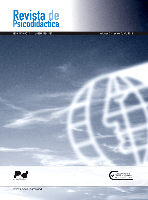
Revista de Psicodidactica
Advancing the Frontiers of Educational PsychologyRevista de Psicodidactica, published by ELSEVIER ESPAÑA, is a leading academic journal dedicated to the fields of Developmental and Educational Psychology. With an impressive impact factor reflecting its high-quality research, the journal has achieved a commendable Q2 ranking in its field for Developmental and Educational Psychology and a Q1 ranking in Education as of 2023. Notably, it holds a significant position in Scopus Ranks, placing in the top 90th percentile in Social Sciences Education and the 84th percentile in Psychology. Launched in 2005, the journal is committed to advancing knowledge in educational practices through empirical research and theoretical frameworks. It provides a vital platform for researchers, educators, and students in Spain and beyond, fostering an open exchange of ideas and innovative approaches to learning and development. Though it is not an open-access publication, it remains a compelling source of contemporary findings for those invested in enhancing educational outcomes.
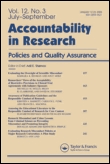
Accountability in Research-Ethics Integrity and Policy
Advancing Ethical Frameworks in Research.Accountability in Research: Ethics Integrity and Policy is a distinguished journal published by Taylor & Francis Inc, focusing on the critical intersection of research integrity and ethical practices within various disciplines. Established in 1989, this journal serves as a vital platform for advancing the understanding of accountability frameworks in research, particularly contributing to the fields of education, library sciences, and miscellaneous medicine. With a robust impact reflected in its Q1 ranking in Library and Information Sciences and its significant placements in Education and Medicine (Q2), the journal is highly regarded among researchers and practitioners alike. The journal's objective is to promote scholarly discourse on ethical integrity in research practices, making it an essential resource for academics, professionals, and students who wish to foster responsible research environments. Although it does not operate under an open access model, the journal's comprehensive methodology and insightful articles ensure that it remains influential in shaping the future of research accountability and ethics.
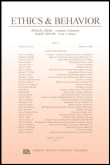
ETHICS & BEHAVIOR
Fostering Innovative Research on Ethical DimensionsETHICS & BEHAVIOR is a leading academic journal published by Routledge Journals, Taylor & Francis Ltd that has been at the forefront of ethical and behavioral research since its inception in 1991. With an ISSN of 1050-8422 and an E-ISSN of 1532-7019, the journal is committed to exploring the complex interactions between morality, ethics, and human behavior in various social contexts. Recognized for its significant contribution to the field, ETHICS & BEHAVIOR holds a notable Q2 ranking in both general psychology and social psychology categories, with impressive Scopus rankings reflecting its academic impact and relevance. Although the journal is not open access, it remains an indispensable resource for researchers, professionals, and students seeking to understand the ethical dimensions of human behavior. Covering diverse topics from applied ethics to behavioral studies, ETHICS & BEHAVIOR serves as a platform for innovative ideas and rigorous empirical research, shaping the discourse in psychology and social sciences. Address: 2-4 Park Square, Milton Park, Abingdon OX14 4RN, Oxon, England.

IARTEM e-Journal
Building Bridges Between Research and Educational PracticeIARTEM e-Journal, published by the International Association of Research Textbooks & Educational Media, serves as a vital resource in the field of educational research and media studies. With an ISSN of 1837-2104, this journal offers a platform for scholars and practitioners to disseminate high-quality research findings, fostering innovative approaches to textbook research and educational media practices. Although listed as non-open access, the journal remains accessible to a diverse audience through institutional subscriptions and academic libraries. By prioritizing the exploration of emerging trends and challenges within educational contexts, the IARTEM e-Journal aims to contribute to the development of effective education methodologies and resource utilization, making it an essential read for researchers, educators, and policymakers. Based in Utrecht, Netherlands, the journal is dedicated to promoting scholarly dialogue and advancing the role of educational resources in the learning process.

MIER-Journal of Educational Studies Trends and Practices
Innovating methodologies to elevate educational experiences.MIER-Journal of Educational Studies Trends and Practices is a pivotal academic journal dedicated to advancing the field of education, focusing on innovative research and trends that influence teaching and learning practices. Published by the esteemed MODEL INST EDUCATION & RESEARCH, this journal offers a platform for researchers, educators, and students to disseminate knowledge and insights on various educational methodologies, curricular developments, and pedagogical theories. While the journal's current impact factor is not specified, its commitment to fostering scholarly discourse positions it as a notable contributor to the field. With an ISSN of 0976-8203 and an E-ISSN of 2319-1945, MIER aims to promote open access to current educational research, making it accessible to a global audience. By engaging with contemporary educational issues and emerging practices, this journal serves as a valuable resource for those dedicated to enhancing educational outcomes and developing effective teaching strategies.

International Journal of Sociology of Education
Advancing Knowledge in Education through SociologyThe International Journal of Sociology of Education, published by HIPATIA PRESS, stands as a pivotal platform for scholars and practitioners in the fields of education and social sciences. Established in 2012 as an open-access journal, it aims to foster a deeper understanding of the interplay between sociological theories and educational practices. With an ISSN of 2014-3575 and a growing reputation reflected in its Q2 and Q3 quartile rankings across relevant categories, the journal is indexed in major databases, ensuring high visibility and citation potential. The journal's Scopus rank highlights its significant standing within the educational and social sciences community, particularly at the 73rd and 83rd percentiles respectively. Based in Barcelona, Spain, it invites contributions that address diverse sociological perspectives and their implications for educational systems worldwide. By providing a collaborative forum for research, this journal not only enriches academic discourse but also serves as an essential resource for policy-making and curriculum development, making it invaluable for researchers, professionals, and students alike.
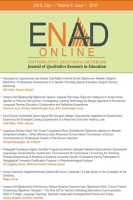
Journal of Qualitative Research in Education-Egitimde Nitel Arastirmalar Dergisi
Unlocking the potential of qualitative methodologies in education.Journal of Qualitative Research in Education - Egitimde Nitel Arastirmalar Dergisi, published by ANI PUBLISHING, serves as a vital platform for advancing the field of educational research through qualitative methodologies. This Open Access journal, available since 2013, encourages the dissemination of innovative research and diverse perspectives within the field, contributing significantly to academic discourse surrounding educational theories and practices. With the ISSN 2148-2624, it invites contributions from researchers, professionals, and students dedicated to exploring the complexities of educational experiences and outcomes. By fostering an inclusive academic community, the journal not only enriches educational research in Turkiye but also provides global insights that are crucial for policy-making and educational transformation.

Yuksekogretim Dergisi
Fostering Knowledge and Collaboration in Education.Yuksekogretim Dergisi, published by TUBA-Turkish Academy of Sciences, is a pivotal platform in the field of higher education research, offering a critical lens on innovative educational practices, academic policies, and pedagogical advancements. Although specific impact metrics such as H-Index and Scopus ranks are currently unspecified, the journal's commitment to publishing high-quality, peer-reviewed articles positions it as a significant contributor to the discourse surrounding higher education in Turkey and beyond. With an ISBN of 2146-796X and an E-ISSN of 2146-7978, Yuksekogretim Dergisi invites researchers, professionals, and students to engage with contemporary issues in the realm of university education, explore scholarly insights, and contribute to the evolving practices within the academic landscape. The journal serves as an Open Access resource, enhancing accessibility to knowledge and fostering a collaborative educational environment.